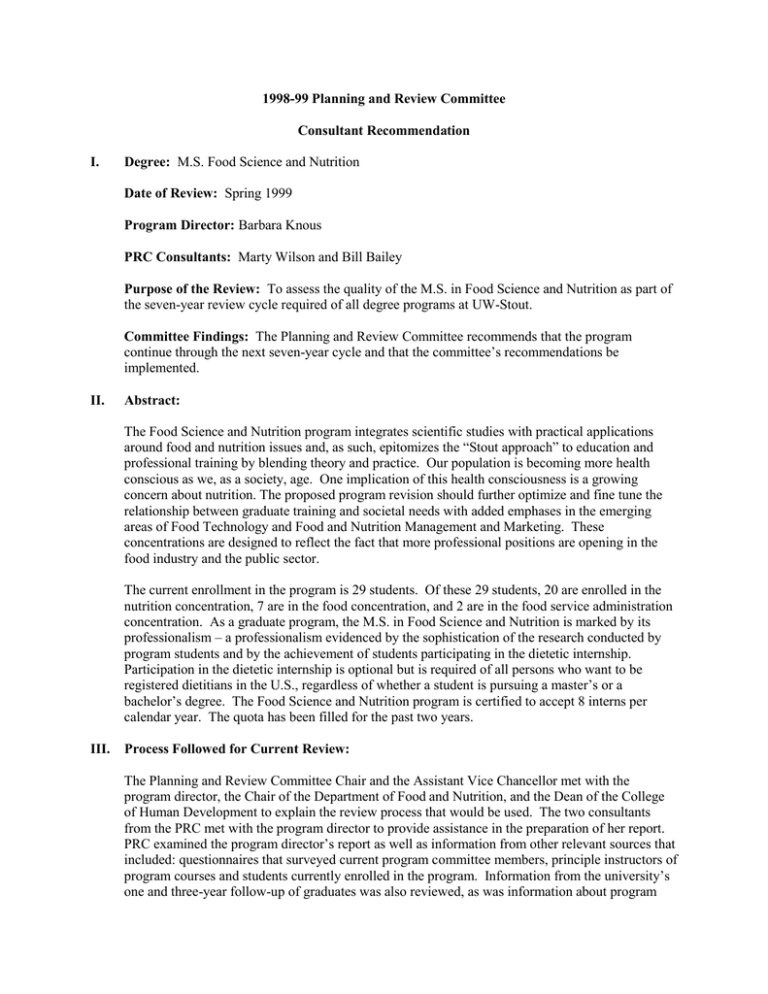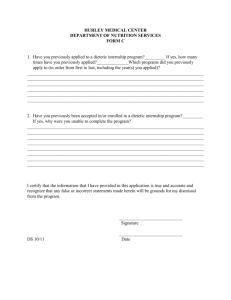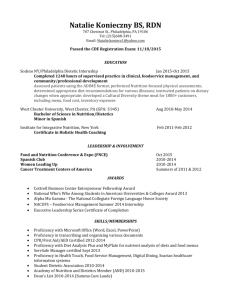1998-99 Planning and Review Committee Consultant Recommendation I.
advertisement

1998-99 Planning and Review Committee Consultant Recommendation I. Degree: M.S. Food Science and Nutrition Date of Review: Spring 1999 Program Director: Barbara Knous PRC Consultants: Marty Wilson and Bill Bailey Purpose of the Review: To assess the quality of the M.S. in Food Science and Nutrition as part of the seven-year review cycle required of all degree programs at UW-Stout. Committee Findings: The Planning and Review Committee recommends that the program continue through the next seven-year cycle and that the committee’s recommendations be implemented. II. Abstract: The Food Science and Nutrition program integrates scientific studies with practical applications around food and nutrition issues and, as such, epitomizes the “Stout approach” to education and professional training by blending theory and practice. Our population is becoming more health conscious as we, as a society, age. One implication of this health consciousness is a growing concern about nutrition. The proposed program revision should further optimize and fine tune the relationship between graduate training and societal needs with added emphases in the emerging areas of Food Technology and Food and Nutrition Management and Marketing. These concentrations are designed to reflect the fact that more professional positions are opening in the food industry and the public sector. The current enrollment in the program is 29 students. Of these 29 students, 20 are enrolled in the nutrition concentration, 7 are in the food concentration, and 2 are in the food service administration concentration. As a graduate program, the M.S. in Food Science and Nutrition is marked by its professionalism – a professionalism evidenced by the sophistication of the research conducted by program students and by the achievement of students participating in the dietetic internship. Participation in the dietetic internship is optional but is required of all persons who want to be registered dietitians in the U.S., regardless of whether a student is pursuing a master’s or a bachelor’s degree. The Food Science and Nutrition program is certified to accept 8 interns per calendar year. The quota has been filled for the past two years. III. Process Followed for Current Review: The Planning and Review Committee Chair and the Assistant Vice Chancellor met with the program director, the Chair of the Department of Food and Nutrition, and the Dean of the College of Human Development to explain the review process that would be used. The two consultants from the PRC met with the program director to provide assistance in the preparation of her report. PRC examined the program director’s report as well as information from other relevant sources that included: questionnaires that surveyed current program committee members, principle instructors of program courses and students currently enrolled in the program. Information from the university’s one and three-year follow-up of graduates was also reviewed, as was information about program enrollment, costs, and placement. On March 5th, the program director, accompanied by the Chair of the Department of Food and Nutrition (who was also the past program director of the M.S. in Food Science and Nutrition) and an Associate Dean of the College of Human Development, met with PRC. IV. Previous Review: Two of the 1991 recommendations related to the pending AP4 program of the American Dietetic Association (1. Emphasize the advantages of the AP4 program in student recruitment and, 4. Maintain the flexibility of individual study to the extent allowable under AP4 requirements) have been largely achieved with the current dietetic internship which is now the accepted term for what was, in the past, termed the AP4 program. Marketing and recruitment are still an issue in that enrollments have slipped somewhat in recent years; while the nutrition concentration is doing well, more emphasis could be placed on the food science concentration. The new concentrations in Nutrition Management and Marketing should be attractive to prospective students (see Recommendation #1, below). The third 1991 recommendation (“Offer courses frequently enough so students have adequate selection of preferred courses”) is still an issue (see Recommendation #4, below). The second recommendation, that practitioners continue to be involved to assure up-to-date practice information, would always be a relevant suggestion, but with the strength of the internship, this is not currently regarded as a problem. V. Program Review Program Strengths: 1. Quality of research experience. The quality of research is evidenced by rewards received at national conferences and presentations in peer reviewed journals. In addition, many students choose the thesis option for degree completion. Even though the quality of research is currently strong, the program revision, with the addition of Research in Food and Nutritional Science, will enhance the relevance of the research preparation. 2. Quality and commitment of faculty. Given the small number of faculty relative to the number of students enrolled in the graduate program (as well as the three other programs served by this faculty), faculty quality and commitment is high. Both the supervision involved in the internship and the advisement involved in planning and managing graduate research projects are quite demanding. 3. The internship and student achievement on dietetic registration exam. The overall pass rate is 95.2 percent for students enrolled in this program, compared to 89% nationally. 4. Placement. The demand for graduates is high and all students who complete the dietetic internship are employed. Employer requests are frequently unmet because program graduates have already accepted employment. Issues of Concern: 1. Current faculty recruitment. The Department of Food and Nutrition is currently recruiting for two faculty positions and, recently, a third department member resigned. Competent, degreed faculty with professional experience and appropriate expertise are critical to the success of this program. 2. Nutritional Assessment Lab. A functional lab is essential to ensure the survival of the program and the optimal performance of the dietetic interns. 3. Graduate student support through scholarships and assistantships. The dietetic internship is very demanding and requires a full time commitment. While students are interning, they are not registered for the nine credits that are a prerequisite for graduate assistantships (and for student loans). In addition, being off campus prevents them from meeting assistantship responsibilities. While financial support of graduate education is needed throughout the university, the financial plight of these interns is critical. 4. Periodicals in the library: Library personnel have been extremely cooperative in meeting the needs of the students; yet, some periodicals central to the program remain unavailable. 5. Number of availability of graduate courses: The surveys completed by the program committee, key instructors, and students indicated that there were not enough sections of graduate courses, in both of the program concentrations but especially in the food science area. 6. Nutritional counseling lab. Students in the nutrition concentration who are enrolled in the dietetic internship need to develop nutrition counseling skills. Currently facilities are not available to adequately accommodate this activity. 7. Ability to reach and serve the potential population of working dieticians. Many dieticians who are working full time would like to pursue a master’s degree but find it impractical to enroll in a graduate program with a traditional delivery system. Recommendations for the Dean: 1. Faculty Recruitment. Given the necessary commitment of the faculty for this program and the extent of involvement in student research, it is vital that the existing open positions be filled. To that end, the dean in consultation with the Food and Nutrition Department, should offer competitive salaries. 2. Labs. The Nutritional Assessment Lab and the Counseling Lab are critical to the success of this program. To that end, the dean in consultation with the program director should identify required resources and acquire funding to complete the labs. 3. Graduate student support. The dean, in consultation with the provost, should attempt to identify some source of funds to support students in this program, particularly those in the internship. Recommendations for the Program Director: 4. Distance education. As indicated above, dieticians who are working full time would like to pursue a master’s degree but find it impractical to enroll in a graduate program with a traditional delivery system. To that end, program director, the program advisory committee, and key instructors should draft a plan that evaluates alternative instructional delivery systems. 5. Number and availability of courses. In light of the program revision and anticipated new hires, the problem of too few graduate course offerings should be alleviated. However, the program director should continue to monitor course availability, course enrollment, and new course offerings. 6. Library resources. The program director should continue to work with the library staff to set priorities for the periodicals needed for this program.




